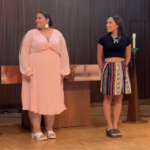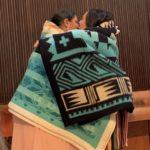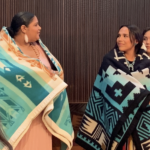On July 25, 2023, the Emory News Center highlighted the National College Horizon workshop where in Indigenous students gathered to learn about the college process. To read more, click here: Emory hosts national College Horizons workshop for Indigenous students.
Category Archives: Voices and Viewpoints
Celebration of Native American and Indigenous Graduates of 2023


Congratulations to NAIS’s new graduates Iliyah Bruffett and Sierra Talavera-Brown!
Watch the recording of the 2023 Celebration of Native American and Indigenous Gradates here and view the photo gallery of the event here.
Dr. Leonard Lectures On Indigenous Language Reclamation
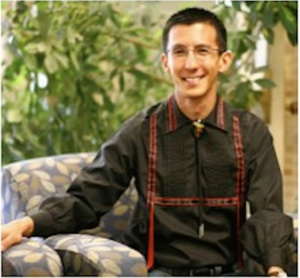 On April 10 2023, Dr. Wesley Leonard, citizen of the Miami Tribe of Oklahoma and associate professor at the University of California, Riverside, delivered a lecture about Indigenous reclamation of language. He began with an introduction of himself in myaamia, the Miami lan guage. He then narrated the Miami history of removal, his work to reclaim the Miami language, and explained how Native languages interact with the field of linguistics.
On April 10 2023, Dr. Wesley Leonard, citizen of the Miami Tribe of Oklahoma and associate professor at the University of California, Riverside, delivered a lecture about Indigenous reclamation of language. He began with an introduction of himself in myaamia, the Miami lan guage. He then narrated the Miami history of removal, his work to reclaim the Miami language, and explained how Native languages interact with the field of linguistics.
Dr. Leonard emphasized the difference between revitalization and reclamation of Indigenous languages because these languages are still being spoken. Revitalization invokes bringing life back into a language, but Dr. Leonard argues that these languages were never dead. It was just sleeping until users woke it up.
His central theme was the ”Seven R’s” respecting the land, the language, and the people who use the language; relevance of language education for learners and communities; reflexivity which examines one’s cause for action and prospective; incorporating Native understanding of reciprocity; responsibility of learning the language’s history; rights of the Indigenous users of the language to create their own curriculum; and relationality/relational accountability which is a holistic view of our relationship with our knowledge acquirement and accountability to the users of the language.
Dr. Leonard followed by looking at how the field of academic linguistics’ influences understandings of Native languages. The current study of linguistics breaks down language into subcategories and units. This diminishes the relational understanding integral to Native cultures. Dr. Leonard emphasized that “language is the blanket that holds all of our culture.” He has worked to change the narrative of myaamia from “mining” an “extinct” language created to erase Native history to centering myaamia and other Native languages being actively used in the present.
He concluded his lecture with reaffirming the purpose of Indigenous language reclamation. Reclamation centers on the Native community’s understanding of language, dismantling colonial discourse surrounding languages, promote engagement with communities at various levels of use, and foster allyships grounded in the Seven R’s.
Dr. Frye’s Reflections As The Former Tribal Surgeon General Of The Muscogee Creek Nation
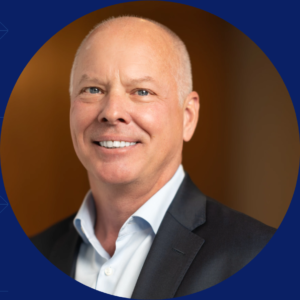
On April 4th, Dr. Lance Frye, the former Surgeon General of the Muscogee Creek Nation, spoke at the Rollins School of Public Health’s third annual National Public Health Week.
Dr. Frye has an expansive background working in residency, private practice, the military, the state of Oklahoma and California, and Tribal governments. He knew his passion in life was to help others and make a difference, especially in the field of women’s health. He shared personal stories on how he met his wife in the army and how his son found himself with six cats. During his time practicing Military Air Space Medicine, he learned how to practice herd health. Dr. Frye traveled to Nicaragua, Uganda, and Malawi. He praised the work of Sister Rosemary Nyirumbe for resisting the army and protecting the young girls of Uganda.
Dr. Frye, who served as the Commissioner of Health for Oklahoma, highlighted some important events that marked the beginning of the COVID-19 pandemic. On March 6th, 2020, the first case of COVID-19 was reported in Oklahoma. This was followed by the cancellation of the Oklahoma City Thunder Game on March 11th, the inability of the Princess Cruise to dock on March 16th, and the initiation of lockdowns on March 24th. At the onset of the pandemic, Oklahoma, like the rest of the country, was unprepared to handle the pandemic and lacked the necessary supplies. The situation looked grim, with an expected death count of 13,000. It was an all-hands-on deck operation. He had to rapidly improve infrastructure, create proper response guidelines, clean up the inner records keeping of the Oklahoma State Department of Health, and fight for personal protective equipment along with many other struggles to protect Oklahoma against the pandemic.
Dr. Frye recounted how the governor of Oklahoma called the National Guard and established a multi-agency command to consolidate resources. He was a part of the Governor’s Solution Task Force as the Commissioner of Health. His task was to get supplies and reach out to the hardest hit facilities: hospitals and senior living facilities. The Oklahoma State University Project Extension for Community Healthcare Outcomes (ECHO) was adopted to connect and relay health information, especially to rural communities. More than 150 ECHO sessions and over 40,000 parties participated in this project. Their main goal for recovery was vaccine promotion and distribution. The rollouts occurred promptly with nurses being vaccinated in December 2020, himself and the governor in March of 2021 and actress Kristin Chenoweth in April of that same year.
The United States was very politically divided over the vaccines and Oklahoma was no different. There were many strong, consistent voices against vaccines and masks who were very influential during policy decisions. The economic shutdown was also a hard decision to enact even though it was the best course of action. Many Tribal governments formed vaccine lines and mobilized large efforts such as talking to casino heads to transferred skills to rolling out the vaccine. These efforts were open to everyone which helped make vaccines accessible. Dr. Frye facilitated many conversations and collaborations with hospitals, suppliers, and other organizations helping the effort.
Dr. Frye and the leadership of Oklahoma felt that they made the correct yet difficult decisions. In 2022, Dr. Frye was appointed as the first Surgeon General of the Muscogee Creek Nation. He entered this role because he felt that he could make a positive change within the Muscogee Nation’s health system. He reflected on how hard it was to operate the public health department. There are 39 federally recognized tribes in Oklahoma because of ongoing historical traumas and complex Tribal-state boundaries. All these need to be addressed within the public health system.
Some of the public health issues Dr. Frye worked to solve is the diet crisis within Tribal nations. The Federal Indian Removal Act of 1831 and the legacies of “Trail of Tears” disrupted traditional food ways and the US rations did not provide the same nutritional value as Native foods from the homeland. Processed food products like flour, lard, and sugar increased the rates of poor health outcomes such as diabetes by three time within the Muscogee Creek Nation. While working through approaches, Dr. Frye and his team looked through historical data, surveyed the opinion of leaders, established a data collection to recoding and share patient information, and worked to ensure that the health services Dr. Frye sought to build met them need of the patients seeking care. One program Dr. Frye enacted to address some of the health concerns of the Muscogee Creek Nation was the Muscogee Creek Nation Diabetes Program. The program included the motto “Stay Active to Stay Healthy”; they boosted hospitals, schools, and cultural center’s resources to support the program. The internal medicine departments of hospitals also hired more specialized healthcare professionals to meet the demands of the program.
A hurdle Dr. Frye worked to overcome was the historical underfunding of Tribal Health by developing a self-governed health care system under the Indian Self-Determination and Education Assistance Act (ISDEAA). The 2020 Supreme Court case McGirt vs Oklahoma upheld Muscogee Creek Nation’s sovereignty and self-governance. State and tribal governments had to adjust for preexisting systems because Muscogee Nation had to build up their own public health system as opposed to sharing departments with Oklahoma. New Tribal policies need to be codified to establish authority, financial allocations, and set public health codes. To create a robust Health Department, Dr. Frye has worked build an inter-tribal and tribal-state collaboration to set up and share essential public health services with Tribal nations who have the best resources to fulfill them.
There are still challenges Dr. Frye faced such as silos of communication, lack of accessible patient data, funding, coordination, collaboration, and complex politics. Dr. Frye ended his talk with the reminder that everyone in public health—by extension healthcare, works together for a common goal. Some of the lessons Dr. Frye has taken from his experience as the first Surgeon General of the Muscogee Creek Nation was the importance of modernized and proactive data to implement preventive measures instead of reactivity. He also focused on the importance of collaboration, competence of providers with Indigenous cultures, and striving for long-term benefits.
Emory Report: “New Center for Native and Indigenous Studies Set to Launch in Fall 2023”
On April 26, The Emory News Center announced that the Emory College of Arts and Sciences is set to launch a new Center for Native American and Indigenous Studies this fall to advance and inspire research, scholarship, teaching and learning rooted in and related to Indigenous studies. To read more click here.
New Center for Native and Indigenous Studies set to launch in fall 2023
Emory Wheel Highlights Mellon Foundation Grant for Emory’s Indigenous Studies in Partnership with the College of the Muscogee Nation
On February 15, the Emory Wheel published that the Mellon Foundation awarded $2.4 million dollars towards developing an Indigenous Studies at Emory University in collaboration with the College of Muscogee Nation. Read about it here.
Mellon Foundation awards Emory $2.4 million to advance Indigenous studies and knowledge with the Muscogee Nation
On February 14, the Emory News Center published that “The Mellon Foundation has awarded Emory University and the College of the Muscogee Nation (CMN) in Oklahoma a $2.4 million grant that will help develop collaborative and independent programs advancing Native and Indigenous Studies and the preservation of the Mvskoke language in a unique partnership between the two schools.” Read more here.
https://news.emory.edu/stories/2023/02/er_mellon_grant_14-02-2023/story.html
Megan O’Neil Lecture: “The Ancient Maya: (Not A) Lost Civilization”
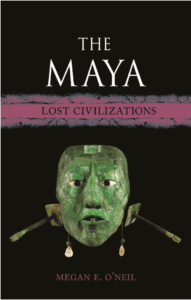
In a virtual lecture hosted by the Carlos Museum and the Native American and Indigenous Studies Initiative (NAISI) on January 19, 2023, Professor Megan O’Neil, Assistant Professor of Art History at Emory University and Faculty Curator of the Art of the Americas, delved into the complex and often misunderstood history of the Mayan Civilization. Titled “The Maya: (Not A) Lost Civilization,” Dr. O’Neil’s lecture aimed to challenge the misconceptions and biases that have long clouded our understanding of the ancient civilization, and instead center the voices of the Mayan people themselves in the telling of their history.
Dr. O’Neil began by providing context for the lecture, outlining the geographic location and major architectural achievements of the Mayans, as well as their relationships with other Indigenous communities in Mesoamerica. She then delved into the colonial attempts to explain the Mayans through a Euro-American lens, which erased enduring histories of Mayan presence and cultural continuity in their homeland. These erasures and colonial mythologies have had lasting ramifications to this day– from wild conspiracy theories of “ancient aliens” to the destruction of Mayan cultural heritage sites.
Along with a new generation of researchers, linguists, and Mayan script writers, Dr. O’Neil is dismantling misconceptions with a return to Mayan history told through encoded literature, oral tradition, and temple inscriptions. Together, they are deciphering ancient Mayan scripts which reveal the daily lives of everyday Mayans, legacies of powerful rulers, and artistic styling of Mayan inscriptions. Knowledge encoded as riddles within monastic manuscripts produced during the first waves of colonial Christianization the Mayan people are reemerging traditional records and regional dialects. Previous generations of scholars projected their patriarchal views onto Mayan art, but now, modern reexaminations reveal the egalitarian relationship between men and women in all aspects of Mayan societies.
Professor O’Neil ended the lecture spotlighting the works of many contemporary Mayan artists who strive to reclaim Mayan culture such as Walter Paz Joj, a Mayan scribe who create new scripts inspired by ancient Mayan inscriptions, and Balam Ajpu, a Mayan hip-hop group who creates music to reclaim Mayan expression. She also highlights the work of numerous activists,like Victor Montejo, Demetrio Cojti Cuxil, and Avexnim Cojti Ren, who secure Mayan representation in research, access to their cultural spaces, and rights for Mayans to tell their own story on their own terms.
Professor Megan O’Neil’s The Maya: Lost Civilization is available at the Carlos Museum bookstore. Look forward to her upcoming projects and new exhibition at the Carlos Museum (2024) as well. To read more of Dr. O’Neil’s work, click here.
Matowacipi Horse (24C) Presents Her Flourishing at “Emory Explores the Future: Student Flourishing” in DC
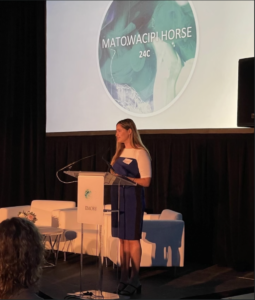
On October 24, 2022, Matowacipi Horse (24C), participated in Emory Explores the Future: Student Flourishing in DC, joining President Fenves and other deans of Emory University to in a celebration of student success at Emory.
Matowacipi recounts that her experience in Washington was “absolutely fantastic.” It was her first time traveling to the nation’s capital, where she encountered numerous historical and political significant places. As a Native American, these places held meanings that she has considered herself separated from before being welcomed in during her visit to Washington.
Emory’s office of Advancement and Alumni Engagement invited Matowacipi as a featured speaker at the event. Matowacipi delivered a five-minute speech on her experiences at Emory and the resources and programs she used or was a part of, and then introduced the panelist of the talk who discussed what the university was doing to support students. At the end of the panel,
Matowacipi had meetings with notable Emory parents, deans, and alumni in DC, including John Troutman (95C), Curator of American Music at the Smithsonian Institution’s National Museum of American History. During their discussions, she learned that he works closely with Dr. Malinda Lowery and that she is opening an exhibit in December. He also offered advice for graduate school and pursuing one’s interest. Her overall experience was positive.
Matowacipi ended the interview with this important takeaway for students, “If there’s any struggle you are going through at Emory, whether that be community, identity, financial, mental health, how to look for an internship, get a job, how to write a resume, there is someone there that can help you, you just need to ask. Your work and experience at Emory is important, people are going to do whatever they can to help you thrive, and that you have the self-advocacy to ask for support.”
Emory Wheel Features Indigenous Language Path Listening Sessions
On November 16, the Emory Wheel featured an article about the Indigenous Language Path Listening Session at Emory’s Oxford and Atlanta campuses.
Emory held Indigenous language path listening sessions to honor Muscogee Nation

